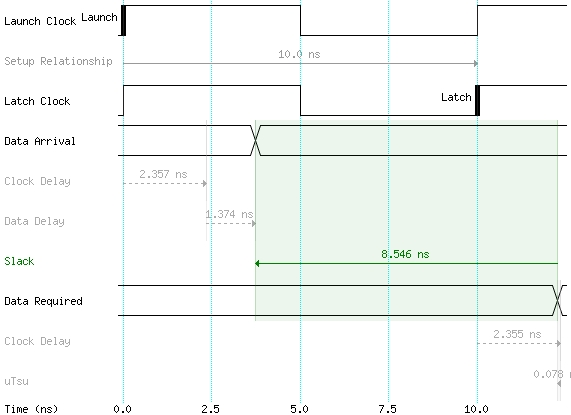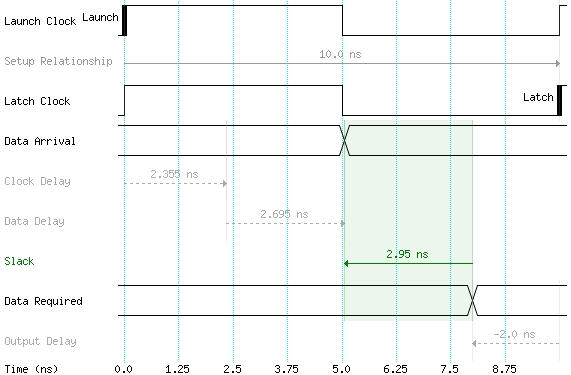


在edn上看到很多仁兄的文章 大受启发 也写写自己的理解 一同讨论
set_input_delay/ set_output_delay
在与时钟选项定义的时钟相关的输入port上定义data
arrival time,可将输入延时定义与上升沿或下降沿相关。
如果输入延时与简单的生成时钟相关,到生成时钟的clock arrival time要加到data arrival time上。
输入延时可以定义与时钟网络中的port相关,到参考port的clock arrival time要加到data arrival time上。
输入延时可以包含时钟源延时,默认条件下,相关的时钟源延时加到输入延时上;但是,当定义-source_latency_included选项时,时钟源延时不要相加,因为它并没有用作为input delay value的时序因素。
max用在时钟建立时间或恢复(recovery)校验上,min用于时钟保持时钟或移除(removal)校验上。
# Simple input
delay with the same value for min/max and rise/fall:
# 1) set on
ports with names of the form myin*
set_input_delay
-clock clk 1.5 [get_ports myin*]
# 2) set on all
input ports
set_input_delay
-clock clk 1.5 [all_inputs]
# Input delay
with respect to the falling edge of clock
set_input_delay
-clock clk -clock_fall 1.5 [get_ports myin*]
# Input delays
for different min/max and rise/fall combinations
set_input_delay
-clock clk -max -rise 1.4 [get_ports myin*]
set_input_delay
-clock clk -max -fall 1.5 [get_ports myin*]
set_input_delay
-clock clk -min -rise 0.7 [get_ports myin*]
set_input_delay
-clock clk -min -fall 0.8 [get_ports myin*]
============================================
以上内容摘自Quartus help,基本定义edn上很多仁兄已经讲的很清楚了。
看下面简单的例子,两级触发器,来自
http://www.altera.com.cn/support/examples/timequest/exm-timequest.html
设计图:
很简单的例子,仅仅加时钟周期约束的条件下,用TimeQuest分析仅会得到一路path的分析,reg1 to reg2,时序图如下:
这张图已经有人做过了仔细的分析,可以清楚地看到各个参数的大小。
下面三张图是加约束后的时序分析图,所加的条件是:
set_input_delay -clock { clk_in }
-add_delay 1.200 [get_ports {data_in}]
set_output_delay -clock { clk_in }
-add_delay 2.000 [get_ports data_out]



可以看到,输入路径在data
arrival time上加上了input
delay;输出路径在data
required time上减去了output
delay;分别表现为对setup和hold时间的影响。
===================================
First time issuing paper on this web,any correction or suggestion is warmly welcome.Thanks!
 /4
/4 
用户554712 2010-10-10 01:11